Synbiotics, prebiotics and probiotics for solid organ transplant recipients
- PMID: 36126902
- PMCID: PMC9489278
- DOI: 10.1002/14651858.CD014804.pub2
Synbiotics, prebiotics and probiotics for solid organ transplant recipients
Abstract
Background: Solid organ transplantation has seen improvements in both surgical techniques and immunosuppression, achieving prolonged survival. Essential to graft acceptance and post-transplant recovery, immunosuppressive medications are often accompanied by a high prevalence of gastrointestinal (GI) symptoms and side effects. Apart from GI side effects, long-term exposure to immunosuppressive medications has seen an increase in drug-related morbidities such as diabetes mellitus, hyperlipidaemia, hypertension, and malignancy. Non-adherence to immunosuppression can lead to an increased risk of graft failure. Recent research has indicated that any microbial imbalances (otherwise known as gut dysbiosis or leaky gut) may be associated with cardiometabolic diseases in the long term. Current evidence suggests a link between the gut microbiome and the production of putative uraemic toxins, increased gut permeability, and transmural movement of bacteria and endotoxins and inflammation. Early observational and intervention studies have been investigating food-intake patterns, various synbiotic interventions (antibiotics, prebiotics, or probiotics), and faecal transplants to measure their effects on microbiota in treating cardiometabolic diseases. It is believed high doses of synbiotics, prebiotics and probiotics are able to modify and improve dysbiosis of gut micro-organisms by altering the population of the micro-organisms. With the right balance in the gut flora, a primary benefit is believed to be the suppression of pathogens through immunostimulation and gut barrier enhancement (less permeability of the gut).
Objectives: To assess the benefits and harms of synbiotics, prebiotics, and probiotics for recipients of solid organ transplantation.
Search methods: We searched the Cochrane Kidney and Transplant Specialised Register up to 9 March 2022 through contact with the Information Specialist using search terms relevant to this review. Studies in the Register are identified through searches of CENTRAL, MEDLINE, and EMBASE, conference proceedings, the International Clinical Trials Register (ICTRP) Search Portal and ClinicalTrials.gov.
Selection criteria: We included randomised controlled trials measuring and reporting the effects of synbiotics, prebiotics, or probiotics, in any combination and any formulation given to solid organ transplant recipients (any age and setting). Two authors independently assessed the retrieved titles and abstracts and, where necessary, the full text to determine which satisfied the inclusion criteria.
Data collection and analysis: Data extraction was independently carried out by two authors using a standard data extraction form. The methodological quality of included studies was assessed using the Cochrane risk of bias tool. Data entry was carried out by one author and cross-checked by another. Confidence in the evidence was assessed using the Grading of Recommendations Assessment, Development and Evaluation (GRADE) approach.
Main results: Five studies (250 participants) were included in this review. Study participants were adults with a kidney (one study) or liver (four studies) transplant. One study compared a synbiotic to placebo, two studies compared a probiotic to placebo, and two studies compared a synbiotic to a prebiotic. Overall, the quality of the evidence is poor. Most studies were judged to have unclear (or high) risk of bias across most domains. Of the available evidence, meta-analyses undertaken were of limited data from small studies. Across all comparisons, GRADE evaluations for all outcomes were judged to be very low certainty evidence. Very low certainty evidence implies that we are very uncertain about results (not estimable due to lack of data or poor quality). Synbiotics had uncertain effects on the change in microbiota composition (total plasma p-cresol), faecal characteristics, adverse events, kidney function or albumin concentration (1 study, 34 participants) compared to placebo. Probiotics had uncertain effects on GI side effects, infection rates immediately post-transplant, liver function, blood pressure, change in fatty liver, and lipids (1 study, 30 participants) compared to placebo. Synbiotics had uncertain effects on graft health (acute liver rejection) (2 studies, 129 participants: RR 0.73, 95% CI 0.43 to 1.25; 2 studies, 129 participants; I² = 0%), the use of immunosuppression, infection (2 studies, 129 participants: RR 0.18, 95% CI 0.03 to 1.17; I² = 66%), GI function (time to first bowel movement), adverse events (2 studies, 129 participants: RR 0.79, 95% CI 0.40 to 1.59; I² = 20%), serious adverse events (2 studies, 129 participants: RR 1.49, 95% CI 0.42 to 5.36; I² = 81%), death (2 studies, 129 participants), and organ function measures (2 studies; 129 participants) compared to prebiotics.
Authors' conclusions: This review highlights the severe lack of high-quality RCTs testing the efficacy of synbiotics, prebiotics or probiotics in solid organ transplant recipients. We have identified significant gaps in the evidence. Despite GI symptoms and postoperative infection being the most common reasons for high antibiotic use in this patient population, along with increased morbidity and the growing antimicrobial resistance, we found very few studies that adequately tested these as alternative treatments. There is currently no evidence to support or refute the use of synbiotics, prebiotics, or probiotics in solid organ transplant recipients, and findings should be viewed with caution. We have identified an area of significant uncertainty about the efficacy of synbiotics, prebiotics, or probiotics in solid organ transplant recipients. Future research in this field requires adequately powered RCTs comparing synbiotics, prebiotics, and probiotics separately and with placebo measuring a standard set of core transplant outcomes. Six studies are currently ongoing (822 proposed participants); therefore, it is possible that findings may change with their inclusion in future updates.
Trial registration: ClinicalTrials.gov NCT02179229 NCT01735591 NCT00364650 NCT02938871 NCT04428190.
Copyright © 2022 The Cochrane Collaboration. Published by John Wiley & Sons, Ltd.
Conflict of interest statement
TC: none known
NSR: none known
JC: none known
CH: has received fees paid to her institution from Janssen and GlaxoSmithKline; Advisory Board fees paid to her from Otsuka; Research Grants to her institution from Otsuka, Shire, Fresenius, and Baxter; none of these are related to the current study. In addition, she has received grants paid to her institution from the Polycystic Kidney Disease Foundation of Australia for work that is not related to the current study
MH: none known
DJ: has previously received consultancy fees, research grants, speaker's honoraria and travel sponsorships from Baxter Healthcare and Fresenius Medical Care. He has also received consultancy fees from AstraZeneca and Awak, speaker's honoraria from Ono, and travel sponsorships from Amgen. He is a current recipient of a National Health and Research Council Practitioner Fellowship
ATP: none known
AT: none known
GW: none known
Figures

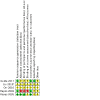

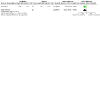
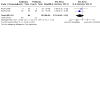
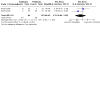
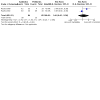
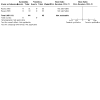
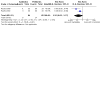
Update of
References
References to studies included in this review
Guida 2017 {published data only}
-
- Guida B, Cataldi M, Memoli A, Trio R, di Maro M, Grumetto L, et al. Effect of a short-course treatment with synbiotics on plasma p-cresol concentration in kidney transplant recipients. Journal of the American College of Nutrition 2017;36(7):586-91. [MEDLINE: ] - PubMed
Liu 2015f {published data only}
-
- Liu H, Zhang S, Guo W. Clinical research on probiotics application in patients after liver transplantation [abstract]. European Surgery [Acta Chirurgica Austriaca] 2015;47(Suppl 1):S160-1. [EMBASE: 71913753]
Orr 2016 {published data only}
-
- Orr DW, Myint H, Murphy R. Probiotic supplementation after very low calorie diet does not aid improvement of the metabolic syndrome or maintenance of weight loss post liver transplant. A randomised double-blind placebo controlled trial [abstract no: 214]. Hepatology 2016;64(1 Suppl 1):113-4A. [EMBASE: 612594308]
Rayes 2002 {published data only}
-
- Rayes N, Brammer M, Hansen S, Mueller AR, Serke S, Seehofer D, et al. Early interal supply of lactobacilli and fibre versus SBD - A prospective randomized trial in liver transplant recipients [abstract no: 640]. Journal of Hepatology 2001;34(Suppl 1):199. [CENTRAL: CN-00360884]
-
- Rayes N, Hansen S, Boucsein K, Seehofer D, Muller AR, Bengmark S, et al. Enteral nutrition containing lactobacillus versus selective gut decontamination after liver transplantation. Zeitschrift Fur Gastroenterologie 2002;40(2):119. [CENTRAL: CN-00645909]
-
- Rayes N, Seehofer D, Hansen S, Boucsein K, Muller AR, Serke S, et al. Early enteral supply of lactobacillus and fiber versus selective bowel decontamination: a controlled trial in liver transplant recipients. Transplantation 2002;74(1):123-7. [MEDLINE: ] - PubMed
Rayes 2005 {published data only}
-
- Rayes N, Seehofer D, Theruvath T, Schiller RA, Langrehr JM, Jonas S, et al. Supply of pre- and probiotics reduces bacterial infection rates after liver transplantation--a randomized, double-blind trial. American Journal of Transplantation 2005;5(1):125-30. [MEDLINE: ] - PubMed
References to studies excluded from this review
ACTRN12618001943235 {unpublished data only}
-
- Plank L. Synbiotics for reducing infections after liver transplantation - a randomised trial [Effect of synbiotics on bacterial infection rates after liver transplantation: a double-blind, randomised, controlled trial]. anzctr.org.au/Trial/Registration/TrialReview.aspx?id=376338&isReview... (first received 30 November 2018).
C000000125 {unpublished data only}
-
- Ichiyama S. A randomised controlled trial to evaluate the effectiveness of perioperative immunonutrition and synbiotics in living-donor liver transplant recipients on reduction of postoperative infectious complication. upload.umin.ac.jp/cgi-open-bin/ctr_e/ctr_view.cgi?recptno=R000000185 (first received 7 September 2005).
Eguchi 2011 {published data only}
-
- Eguchi S, Takatsuki M, Hidaka M, Soyama A, Ichikawa T, Kanematsu T. Perioperative synbiotic treatment to prevent infectious complications in patients after elective living donor liver transplantation: a prospective randomized study. American Journal of Surgery 2011;201(4):498-502. [MEDLINE: ] - PubMed
Grat 2017 {published data only}
-
- Grat M, Krawczyk M, Wronka K, Lewandowski Z, Grat K, Krasnodebski M, et al. Impact of pre-transplant use of probiotics on allograft function after liver transplantation: post-hoc analysis of a randomized controlled trial [abstract]. HPB 2018;20(Suppl 2):S798. [EMBASE: 2001142904]
-
- Grat M, Wronka KM, Lewandowski Z, Grat K, Krasnodebski M, Stypulkowski J, et al. Effects of continuous use of probiotics before liver transplantation: A randomized, double-blind, placebo-controlled trial. Clinical Nutrition 2017;36(6):1530-9. [MEDLINE: ] - PubMed
ISRCTN73842971 {unpublished data only}73842971
-
- Davidson BR. Prospective randomised controlled study to evaluate the role of synbiotic cocktail 2000 before, during and after liver transplantation to increase resistance to infection. www.isrctn.com/ISRCTN73842971 (first received 12 September 2003).
Marks 2010 {published data only}
-
- Marks WH, Spinelli TY, Olmstead SF. Probiotics to reduce immunosuppression-associated diarrhea following kidney transplantation - a prospective double-blinded randomized placebo-controlled trial [abstract no: 96]. American Journal of Transplantation 2010;10(Suppl 4):68. [CENTRAL: CN-01657932]
-
- Marks WH, Spinelli TY, Olmstead SF. Reduction of immunosuppression-associated diarrhea by probiotics following renal transplantation [abstract no: 1226]. Transplantation 2010;90(Suppl 1):441. [EMBASE: 71531915]
PREBIOTIC 2018 {unpublished data only}
-
- Chan S. Prospective randomised evaluation of prebiotics in organ transplantation to prevent infectious complications - feasibility study [Prospective randomised evaluation of prebiotics in organ transplantation to prevent infectious complications]. anzctr.org.au/Trial/Registration/TrialReview.aspx?ACTRN=12618001057279 (first received 25 June 2018).
PrePro 2018 {published data only}
-
- Mallick S, Kathirvel M, Thillai M, Sethi P, Durairaj MS, Nair K, et al. PrePro Trial: randomized double-blind placebo controlled trial to analyze the effect of synbiotics on infectious complications following living donor liver transplantion [CTRI no. - CTRI/2017/09/009869] [abstract]. HPB 2018;20(Suppl 1):S283-4. [EMBASE: 2000962392]
-
- Mallick S, Mathew JS, Binoj S, Unnikrishnan G, Menon RN, Dinesh B, et al. PrePro trial: a randomized double blind placebo controlled trial to analyze the effect of synbiotics on infectious complications following living donor liver transplant (LDLT) [CTRI/2017/09/009869] [abstract no: O-110]. Transplantation 2018;102(5 Suppl 1):63. [EMBASE: 622538666]
Rayes 2002a {published data only}
-
- Rayes N, Seehofer D, Muller AR, Hansen S, Bengmark S, Neuhaus P. Influence of probiotics and fibre on the incidence of bacterial infections following major abdominal surgery - results of a prospective trial [Einfluss von Probiotika und Ballaststoffen auf die Inzidenz bakterieller Infektionen nach viszeralchirurgischen Eingriffen - Ergebnisse einer prospektiven Studie]. Zeitschrift fur Gastroenterologie 2002;40(10):869-76. [MEDLINE: ] - PubMed
References to ongoing studies
ChiCTR1800017180 {unpublished data only}
-
- Hu Y. Study of clinical effects in liver transplantation with probiotics-optimized early enteral nutrition of ERAS. trialsearch.who.int/Trial2.aspx?TrialID=ChiCTR1800017180 (first received 17 July 2018). [CENTRAL: CN-01909182]
ChiCTR1800018122 {unpublished data only}
-
- Fan J. Probiotics decrease the occurence of metabolic disorders under the guidance of FMO3 genotype after liver transplantation. trialsearch.who.int/Trial2.aspx?TrialID=ChiCTR1800018122 (first received 31 August 2018). [CENTRAL: CN-01908537]
DIGEST 2021 {published data only}
-
- Singer J, Li JY, Ying T, Aouad LJ, Gracey DM, Wyburn K, et al. Protocol for a pilot single-centre, parallel-arm, randomised controlled trial of dietary inulin to improve gut health in solid organ transplantation: the DIGEST study. BMJ Open 2021;11(4):e049184. [EMBASE: 634713150]
NCT02938871 {unpublished data only}
-
- Kruel C. Effect of synbiotic on postoperative complications after liver transplantation [Effect of synbiotic on postoperative complications after liver transplantation - a randomized double-blind clinical trial]. clinicaltrials.gov/ct2/show/NCT02938871 (first received 19 October 2016).
NCT04428190 {unpublished data only}
-
- Sener A. Prebiotic therapy to improve outcomes of renal transplant. clinicaltrials.gov/show/NCT04428190 (first received 11 June 2020).
UMIN000024009 {unpublished data only}
-
- Ichiyama S. Randomised control study evaluating the efficacy and the intestinal microbiota by perioperative administration of probiotics for liver transplant recipients. upload.umin.ac.jp/cgi-open-bin/ctr_e/ctr_view.cgi?recptno=R000027646 (first received 12 September 2016).
Additional references
Aron‐Wisnewsky 2016
-
- Aron-Wisnewsky J, Clement K. The gut microbiome, diet, and links to cardiometabolic and chronic disorders. Nature Reviews Nephrology 2016;12(3):169-81. [MEDLINE: ] - PubMed
Azad 2018
Balshem 2011
-
- Balshem H, Helfand M, Schünemann HJ, Oxman AD, Kunz R, Brozek J, et al. GRADE guidelines: 3. Rating the quality of evidence. Journal of Clinical Epidemiology 2011;64(4):401-6. [MEDLINE: ] - PubMed
Beerepoot 2016
Bromberg 2015
-
- Bromberg JS, Fricke WF, Brinkman CC, Simon T, Mongodin EF. Microbiota - implications for immunity and transplantation. Nature Reviews Nephrology 2015;11(6):342-53. [MEDLINE: ] - PubMed
Cremon 2018
-
- Cremon C, Barbaro MR, Ventura M, Barbara G. Pre- and probiotic overview. Current Opinion in Pharmacology 2018;43:87-92. [MEDLINE: ] - PubMed
Davani‐Davari 2019
FAO/WHO 2002
-
- Report of a Joint FAO/WHO Working Group on Drafting Guidelines for the Evaluation of Probiotics in Food. Guidelines for the evaluation of probiotics in food. www.who.int/foodsafety/fs_management/en/probiotic_guidelines.pdf (accessed 27 May 2021).
Gibson 2017
-
- Gibson GR, Hutkins R, Sanders ME, Prescott SL, Reimer RA, Salminen SJ, et al. Expert consensus document: the International Scientific Association for Probiotics and Prebiotics (ISAPP) consensus statement on the definition and scope of prebiotics. Nature Reviews Gastroenterology & Hepatology 2017;14(8):491-502. [MEDLINE: ] - PubMed
GODT 2020
-
- Global Observatory on Donation and Transplantation. Global Data. World Health Organization (WHO) and the Spanish Transplant Organization, Organización Nacional de Trasplantes (ONT). www.transplant-observatory.org/ (accessed 27 May 2021).
GRADE 2008
GRADE 2011
-
- Guyatt G, Oxman AD, Akl EA, Kunz R, Vist G, Brozek J, et al. GRADE guidelines: 1. Introduction-GRADE evidence profiles and summary of findings tables. Journal of Clinical Epidemiology 2011;64(4):383-94. [MEDLINE: ] - PubMed
Higgins 2003
Higgins 2020
-
- Higgins JP, Thomas J, Chandler J, Cumpston M, Li T, Page MJ, et al. Cochrane Handbook for Systematic Reviews of Interventions version 6.1 (updated September 2020). Cochrane, 2020. Available from www.training.cochrane.org/handbook.
Kato 2008
Lehto 2018
Lewis 1997
-
- Lewis SJ, Heaton KW. Stool form scale as a useful guide to intestinal transit time. Scandinavian Journal of Gastroenterology 1997;32(9):920-4. [MEDLINE: ] - PubMed
Linden 2009
-
- Linden PK. History of solid organ transplantation and organ donation. Critical Care Clinics 2009;25(1):165-84. [MEDLINE: ] - PubMed
Luyckx 2018
Mafra 2019
Pan 2018
-
- Pan W, Kang Y. Gut microbiota and chronic kidney disease: implications for novel mechanistic insights and therapeutic strategies. International Urology & Nephrology 2018;50(2):289-99. [MEDLINE: ] - PubMed
Schunemann 2020a
-
- Schünemann HJ, Higgins JP, Vist GE, Glasziou P, Akl EA, Skoetz N, et al. Chapter 14: Completing ‘Summary of findings’ tables and grading the certainty of the evidence. In: Higgins JPT, Thomas J, Chandler J, Cumpston M, Li T, Page MJ, Welch VA (editors). Cochrane Handbook for Systematic Reviews of Interventions version 6.1 (updated September 2020). Cochrane, 2020. www.training.cochrane.org/handbook.
Schunemann 2020b
-
- Schünemann HJ, Vist GE, Higgins JP, Santesso N, Deeks JJ, Glasziou P, et al. Chapter 15: Interpreting results and drawing conclusions. In: Higgins JPT, Thomas J, Chandler J, Cumpston M, Li T, Page MJ, Welch VA (editors). Cochrane Handbook for Systematic Reviews of Interventions version 6.1 (updated September 2020). Cochrane, 2020. Available from www.training.cochrane.org/handbook.
SONG 2017
-
- SONG Initiative. The SONG Handbook Version 1.0. www.songinitiative.org/reports-and-publications/ 2017.
Sudan 2007
-
- Sudan D, Bacha EA, John E, Bartholomew A. What's new in childhood organ transplantation. Pediatrics in Review 2007;28(12):439-53. [MEDLINE: ] - PubMed
Valdes 2018
WHO 2020
-
- World Health Organization. Transplantation: Human organ transplantation. www.who.int/transplantation/organ/en/ (last accessed 27 May 2021).
References to other published versions of this review
Publication types
MeSH terms
Substances
Associated data
LinkOut - more resources
Full Text Sources
Medical

